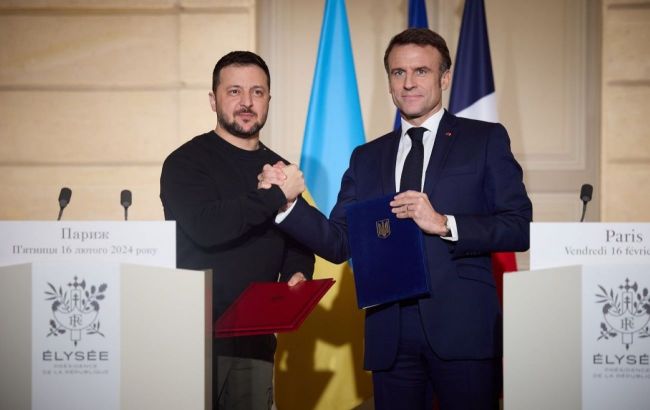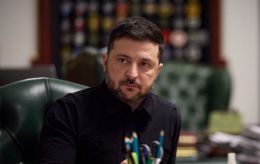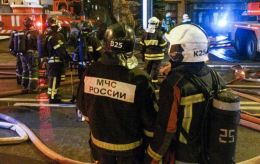Macron assumes sending NATO troops to Ukraine: Feasibility of statement and European leaders' backtracking
 Volodymyr Zelenskyy and Emmanuel Macron at the signing of the security agreement in Paris (Photo: president.gov.ua)
Volodymyr Zelenskyy and Emmanuel Macron at the signing of the security agreement in Paris (Photo: president.gov.ua)
For the first time in the West, the idea of sending troops to Ukraine was raised at the highest level. French President Emmanuel Macron voiced it at an informal summit in Paris, stating that "nothing can be ruled out."
More details on this, reactions from other leaders, and whether partners are indeed preparing to involve their armies can be found in the material by RBC-Ukraine.
The preparation of the material included statements from Ukrainian President Volodymyr Zelenskyy, French President Emmanuel Macron, Western leaders, articles from Reuters and Le Monde, comments from Ukrainian political scientist Volodymyr Fesenko, and military and political expert of the Information Resistance Group, Oleksandr Kovalenko
Content
- "Strategic ambiguity": What Macron said and how partners are reacting
- Is Macron preparing for a new role? What lies behind his statement?
- Why NATO is not ready to fight in Ukraine and are there any prerequisites?
- Troops on a bilateral basis are not an option. What restrains Ukraine's partners
"Strategic ambiguity": What Macron said and how partners are reacting
The words about a possible deployment of troops were spoken on the sidelines of the summit in Paris. At the summit, Emmanuel Macron discussed with leaders from over 20 countries the reinforcement of support for Ukraine in response to Russia's recent successes on the battlefield. Ahead of the meeting, Slovak Prime Minister Robert Fico stated that there was a "limited access document" touching on topics that "send shivers down your spine."
"These topics imply that a number of NATO and EU member states are considering the possibility of sending troops to Ukraine on a bilateral basis. I cannot say for what purpose and what they will do there," he said.
Fico did not specify whether the deployment of contingents was being considered while the war was still ongoing or if it pertained to assistance in post-war reconstruction. Western partners have repeatedly emphasized over the past two years that military assistance would not involve sending soldiers. However, in September, British Defense Minister Grant Shapps suggested the deployment of military instructors, prompting Chancellor Rishi Sunak to clarify that this might not happen in the immediate future but could be considered later.
Czech Prime Minister Petr Fiala responded to Fico's statement, saying that the idea itself is far from being considered, and Czechia, for example, has no intention of sending its soldiers, so "no one should worry about it." However, judging by Macron's speech, open discussion about the possibility of supporting the exhausted Ukrainian forces with Western troops may indeed be taking place.
The French leader has stated that defeating Russia is in the interest of European security and stability, emphasizing that the West does not want Vladimir Putin to win and must prepare for Russian aggression. He also announced coalition deliveries of bombs and missiles of large and medium range to Ukraine and did not rule out the deployment of troops, acknowledging differences on this matter.
"Today, no consensus was reached on sending troops officially and in an approved manner. But nothing can be ruled out dynamically. We will do everything so that Russia cannot win this war… We should not exclude the possibility that there may be a need for security, which would justify some elements of deployment," Macron said.
 Photo: informal summit of Western leaders at the Elysee Palace (elysee.fr)
Photo: informal summit of Western leaders at the Elysee Palace (elysee.fr)
He refused to go into details about which countries are considering sending troops, stating that he believes it is better to maintain "strategic ambiguity." However, his words sharply contrast with the position of other partners of Ukraine, who are trying to avoid escalation. The issue of sending troops is sensitive in Western capitals, especially among NATO member countries led by the United States, which are trying to prevent any form of collective war with Russia, which has nuclear weapons.
Macron's idea did not receive enthusiasm from other leaders, and some of them went into refusal. Dutch Prime Minister Mark Rutte insisted that the issue is not on the agenda. Polish President Andrzej Duda confirmed the intense discussion in Paris.
"The most turbulent discussion centered around sending soldiers to Ukraine. And there was absolutely no agreement on this either," he said after the meeting.
German Chancellor Olaf Scholz also spoke out against it.
"What was agreed from the beginning among ourselves and with each other also applies to the future, namely that there will be no soldiers on Ukrainian soil sent there by European states or NATO states," he noted.
An official White House spokesperson told Reuters that the USA "had no plans to send troops to fight in Ukraine and that there were also no plans to send NATO troops to fight in Ukraine."
The Speaker of the Slovak Parliament, Peter Pellegrini, stated that Slovakia had no intention of deploying troops, and Swedish Prime Minister Ulf Kristersson, whose country will join the Alliance this year, emphasized that "it's not relevant at all right now." Hungarian Foreign Minister Peter Szijjarto said that Budapest remained opposed to supplying weapons and sending troops.
News from Paris is also being commented on by Vladimir Putin. His press secretary Dmitry Peskov called discussions of the possible deployment of Western troops to Ukraine "a very important new element." Responding to questions about the risk of conflict with NATO, he stated that in such a case, one can talk not about the probability, but about the inevitability of direct confrontation.
Is Macron preparing for a new role? What lies behind his statement?
The reaction of Western leaders showed that the idea of sending troops to Ukraine is not being discussed in a broad context and belongs solely to Macron. Obviously, this does not mean that French or other European soldiers will be fighting for Ukraine this year. But it's important to understand why he spoke about it at all and why now.
Ukrainian political scientist Volodymyr Fesenko sees this as a bid for leadership in the EU. First and foremost, Macron wants to play the role of a visionary, and in this sense, he is ahead of other partners. On the other hand, it's possible that he is gauging Europe's readiness to fight, as the topic of risks and threats from Russia is being discussed one way or another. For example, during a Ukrainian lunch at the Munich Security Conference, Polish Foreign Minister Radoslaw Sikorski stated that if the West did not help Ukraine that day, it might have to fight tomorrow.
 Photo: Emmanuel Macron, perhaps preparing himself for the role of European leader (Getty Images)
Photo: Emmanuel Macron, perhaps preparing himself for the role of European leader (Getty Images)
"However, they are not ready to fight. I'll say an unpleasant thing: not only are they not ready to fight for Ukraine, but they are not ready to fight for themselves either. But as stated in a great book, 'In the beginning was the Word' (a reference to the Bible - Ed.). The idea must first be declared: Europeans are not ready for this now, but the idea has been put forward and has become a subject of discussion, and Macron has signaled his ambition for leadership in Europe. Perhaps he is preparing for a special role after stepping down as President of France; he is already in his second term. Previously, this role was played by Angela Merkel; now there is no leader in Europe," he explains in a conversation with RBC-Ukraine.
The second point is a signal to Putin that if he escalates further, Europeans will seriously consider having to fight him. The third and perhaps the main point is a tactic, a traditional method of political rhetoric. It involves stating the goal in the most maximalist form if you want to achieve a specific result.
"By the way, we have constantly used this technique in our relations with our partners and eventually achieved our goals. Not immediately, but we got heavy weapons, air defense systems, tanks, and so on. I think Macron is acting according to the same model," Fesenko says.
In his opinion, such steps may concern the formation of joint contingents, as previously mentioned by the French leader. At the moment, he has put forward the maximum idea that the deployment of troops to Ukraine cannot be ruled out, knowing that partners will not agree. And then he will start pushing them towards creating a conditional European army to hedge against the risks associated with the possible presidency of Donald Trump in the United States. Who recently threatened that Washington would not defend allies who do not "pay the bills."
"Let's be realistic. Macron's statement does not mean that tomorrow the French or representatives of other European countries will be fighting in Ukraine against Russia. But this is the first step in strengthening the EU's military subjectivity. And signals to Putin that Europeans may end up fighting on Ukraine's side. This is a warning," adds the political analyst.
Military and political observer of the Information Resistance Group, Oleksandr Kovalenko, notes that Macron is addressing various geopolitical issues, expanding influence in Armenia, and heading a coalition of long-range weapons supplies to Ukraine.
"Maybe he feels like Napoleon, on a horse, but his statement really raises many questions. What troops will be in Ukraine? For what purpose, why, with what functionality? Will they act as peacekeepers? Then what will they do? Stand along the line of contact and monitor the ceasefire? But why stop the fire if Ukraine has repeatedly stated that we will not stop until we win... Or as full-fledged allies, like during World War II, who will liberate Ukrainian territory? I have big doubts about this. It won't happen, we don't live in the times of Ronald Reagan and Margaret Thatcher, and in general, we are surrounded by quite weak politicians who will not make such tough decisions," he notes.
And the fact that France has the third-largest army in NATO - almost 210,000 troops - does not indicate readiness to fight in Ukraine.
"In my opinion, this is purely rhetoric. And his third army could not cope with the African Sahel region (a belt of 12 countries, including Niger and Mali), where it faced the Wagner PMC (private military company). And they continue to lose their influence there," Kovalenko adds.

